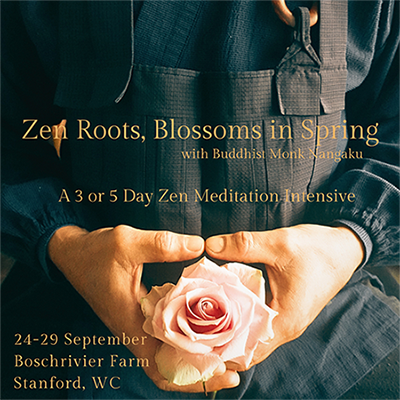Embodied Enlightenment
~ Love in practice ~
From a Buddhist perspective and from the Buddha himself, you are perfect and complete and lacking nothing!
At the moment of the Buddha’s enlightenment he realised that he had always been enlightened – that it was the obscurations of his mind, caused through familial and societal conditioning, that veiled his inherent enlightenment from his awareness.
Since his enlightenment, some 2500yrs ago, Buddhist practices have been developed and perfected to clear these obscurations in the mind. Thousands of practitioners in the various Buddhist lineages have, as a result of coming to their own self-realisation, verified this to be true – that they had always been enlightened, that they have been perfect and complete from the beginning.
This edition of Beyond the Edge examines a quote from Tulku Urgyen Rinpoche. His quote invites each of us to go to the edges of the conditioning in our minds – what we chase after and what we reject – in short, our judgements. To see them, become them, and let them go. In this way we have the profound opportunity to go beyond the edges of their limiting reflections of our trained minds and realise for ourselves our inherent, undistorted perfection -our enlightenment.
“The perfect method for becoming quickly accustomed to the unfabricated state of awareness is to have devotion for the enlightened beings and compassion for the unenlightened beings. Then, as it is said, ‘in the moment of love, the empty essence dawns nakedly’. Devotion and compassion are both love. Body, speech and mind can feel overwhelmed with love, and if you then look inwardly, it is like a sun unobscured by clouds. This is how practitioners could attain enlightenment without being learned.” – Tulku Urgyen Rinpoche.
In Tibetan Buddhism, a tulku is an individual who is spiritually advanced to direct their reincarnation and be able to guide their followers to find their next physical embodiment. Rinpoche, is an honorific term used in the Tibetan language. It literally means “precious one”, and may refer to a person, place, or thing—like the words “gem” or “jewel”. Rinpoche is used in the context of Tibetan Buddhism as a way of showing respect when addressing those recognised as a reincarnated accomplished teacher of the Dharma.
When a Tulku Rinpoche speaks or writes, their words are true and selected with care, without exaggeration or embellishment.
Referring to Tulku Urgyen Rinponche’s quote but said differently…
A tried and tested practical methodology which will rapidly bring you into pure and authentic alignment, is one that cultivates love for both the pure and impure, for the greater and the lesser ones, for the things you like and the things you don’t. In this practice of love, the bare, un-manipulated state of reality breaks open. This embrace of a love-filled-life can come with powerful energy, and if directed inwardly, will reveal your innate deep clarity, beyond the edges of your conditioning.
Or…
The practice of active Love (kindness, at-one-ment, embrace, non-judgement, acceptance etc.) for (i) the beings you consider to be evolved and the beings you consider to be un-evolved, and (ii) the parts of yourself you consider to be bright, shiny, and good, and those parts you believe to be dark, icky, and unacceptable, is the fasted way to enlightenment!
Pretty straight forward and simple! Right? But HOW do you practice this LOVE?
You practice love by having compassion and love for all the parts of yourself. All the parts? Yes, all the parts. And all the time. Nothing left out, ever. The only limitation to your capacity to love all your parts, and by extension all the parts of others, is not knowing all of your parts.

Zen Roots, Blossoms in Spring
Using transformational awareness practices – like meditation – to slow the moments of your life down to be able to be present enough to observe the causes of the manner in which you behave, and what your behaviour in turn causes, will aid you to find more aspects of yourself to love.
If you can’t see your behaviour, or its causes and resulting effects, you haven’t slowed down enough to see what needs witnessing. Slow down more. Take up a practice that allows you a steady and spacious looking glass to clearly see what is going in your consciousness. The non-distracted stillness of meditation offers a powerful lens into the cause-and-effect sequencing of thought and the words and actions that follow.
Once you can witness this for yourself, compassion will naturally arise allowing you to practice embodying enlightenment through love in action in your relationships with others. The more you can practice accessing the tumult of pain and suffering within yourself by getting to what is under the habitual responses to triggering circumstances, the more you will be able to stand steady and observe and practice love in the moments when others trigger you. And, once you have done this a few times and found the transformation and healing available to you there, you will know it to be true, and possible.
Consequently, you will begin to adopt this practice of loving yourself and others more readily, and with greater and greater equanimity. Little by little (and if you’re sincerely committed, by leaps and bounds), you will enter the Way of the Heart. You will have learned how to actively and powerfully direct the transformational energy of love. More and more, through trust, experience and wisdom, you will follow this love path – which, as Tulku Urgyen Rinpoche says, is the fasted way to enlightenment!
Every offering at BEZA is an opportunity for you to hone your capacity for the transformational medicine of love.
Nangaku
